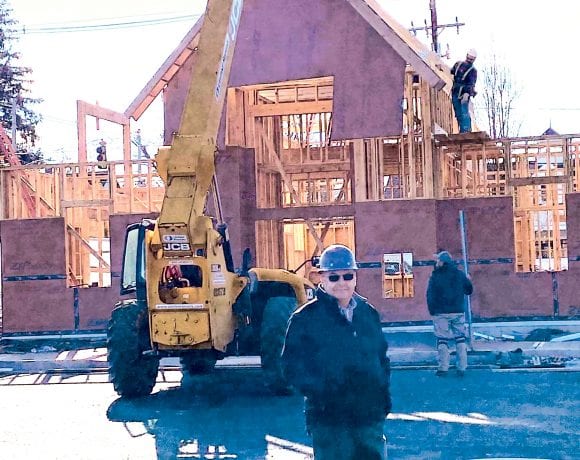Arkansas
Judge Barry Dean Hyde a builder in more ways than one
Published
5 years agoon
Editor

Arkansas – “Had my life been limited to what my imagination was when I was 21 years old, I wouldn’t be anywhere, compared to where I’m at. I feel like the good Lord decided, for whatever reason, that he was going to bless me with opportunities and mentors and a wonderful family and see what I would do with it. Now that I am here to serve and try to benefit the community, I feel like he’s blessed me in that work, too. That’s really it.”
In every phase of his professional life — business, politics and public service — Barry Hyde has been a builder. It’s what he did in creating a successful construction company and how he worked in the Arkansas House of Representatives. And, it’s how he sees his current role as Pulaski County judge, where he builds and strengthens the county from the inside out.
It’s not always glamorous duty, but it all adds up.
“We’re very proud of the work we do but, generally speaking, a lot of it just isn’t sexy,” he says in his trademark straight-ahead style. “We make a big deal out of potholes and roads and ditches, infrastructure.”
Hyde’s office in downtown Little Rock is a kaleidoscope of his life, each piece sliding into place to create the bigger picture, revealing something new from different angles. Hardhats and citations, a gaggle of family photos and maps the size of tablecloths all speak to the work that’s done here, informed by the road that led here.
“I like being involved,” he says. “I like hearing what other people were doing and I like hearing what the problems are. What do we need? What don’t we need? People can be pretty forthcoming to tell you.”
“What he’s doing now as county judge, he’s exceptionally well-suited for,” says Roger Marlin, president and chief executive officer of Hydco, the contracting company Hyde founded and built. “He’s very passionate about growth. He’s very passionate about the citizens of this county, that they have jobs, that they’re well taken care of.”
Barry Hyde was born into the brawny Midwest in Painesville, Ohio, a working poor suburb of Cleveland. His father, Gordon, was a mechanic in a factory and his mother, Lou Esther, was a beautician and entrepreneur. There wasn’t much to go around, but Hyde waves off going too far down that road.
“Poor is a relative term,” he says dismissively. “We always had something to eat.”
From his earliest memory, Hyde was influenced by his mother, a strong-willed Louisiana Cajun from Port Barre, the youngest of 13. Lou Esther met Gordon at a USO dance during the Korean War era and when he got back stateside, he was stationed in her area with the Army Air Corps. They married and, at the end of his hitch, moved to his hometown of Cleveland.
Under Lou Esther, life in the Hyde household revolved around work and faith. The five kids — three boys and a girl, into which Barry fell third — dutifully attended Mass and parochial school at nearby St. Mary Church. They all worked early in life and took their recreation where they could find it.
“My neighborhood was immediately adjacent with the African American neighborhood,” Hyde says. “Those kids I always felt like were just like me. We played ball, we wrestled, we chased girls, whatever. There wasn’t any prejudice there. As kids, we’d ride our broke-down little bikes to the [lake] beach or all across town.”
By the time Hyde got through middle school, a new Catholic high school had just opened nearby and his was the inaugural class to walk through its doors. The brand-new environment with its state-of-the-art classroom amenities and coed student body was like visiting another planet, but even here, the schisms of the real world were still very real.
“It was a college prep, private Catholic school and there were a lot of rich kids,” he says. “I can remember a kid who had a brand-new Jaguar when we became sophomores. There was a lot of those wealthy kids.
“I always had to work. My first job, I think I was 12, was a summer job at a nursery weeding fields for a little company there in Painesville. Then later I had to pay my [high school] tuition. I got a job with the guy who was charged with landscaping the 50 or 60 acres that my new high school was built on.”
Hyde wasn’t embarrassed by his blue-collar background; much of what he saw out of his wealthier peers he rejected as excessive and wasteful. But the affluence around him did serve as ample inspiration to achieve and stand out.
“I gained confidence in high school, mostly from sports, to be more outgoing and feel more accepted,” he says. “Matter of fact, I was the student body vice president for my last two years there. It was a comfortable setting and it was a challenge to me. I wanted to have access to the amenities that I saw, to have nice clothes and to go to college. That really helped drive me.”
Hyde wasn’t a good student except in math and science, but the curriculum at his high school was so advanced even his middling grades were good enough to get into Ohio State University and the U.S. Air Force. He chose the latter and after training in Texas, was assigned to missile duty in Arkansas in 1975.
“There used to be 17 ICBMs [intercontinental ballistic missiles] in north Central Arkansas and I was a member of one of those teams,” he says. “We all had top secret security clearances with an extensive background investigation, because we decoded launch messages.
“One of the things you learned quick was to not think about having 16 nuclear missiles aimed at you. If everything was detonated simultaneously there were enough nuclear weapons in 1975 to knock the earth off its axis eight times. The reality was, if war ever broke out it was the end of the world. I mean, there was just no way anybody would survive this mess because everybody was going to shoot off everything they had.”
Following military service, Hyde returned to Cleveland, where he soon married and started a family. He’d initially planned to attend Ohio State’s architecture program on the GI Bill, but considered that too much of an undertaking with a family to support. So, he signed on as an apprentice carpenter with a home builder.
“The best job I ever had in my life was framing houses,” he says. “It’s just a really fun job because every day, every afternoon for that matter, you could see your progress from the morning. You just saw things grow out of the ground.”
Hyde also got his first taste of entrepreneurship, launching his own framing company. But as the local Rust Belt economy began to collapse, he packed up the family and headed to Texas, signing on with a company building nuclear power plants. This gave him an education in commercial building and opportunity was booming. But Hyde didn’t see the Houston area as family-friendly, so he eventually moved to Arkansas, taking a job with the venerable firm Pickens-Bond of Little Rock.
After about a year, he got a call from Murson Construction, a former employer in Texas, asking him to move back. He declined, but talked his way into opening a franchise office in North Little Rock. At just 27, he had the energy and drive to make his mark and things took off. Hyde bought a spread upon which he built a 4,700-square-foot dream home.
“Goes back to that high school with all those rich kids who had these huge houses and cars and stuff,” he says thoughtfully. “That was a huge accomplishment for me. That was a big check box.”
OUT OF WORK
He’d no more than put the welcome mat on his dream home than the phone rang: Murson Construction had run aground and Hyde was out of a job.
“It was incredibly stressful,” he recalled. “I had just finished this big house and got this big-ass mortgage. I’m starting to build a good reputation for myself but I already know other contractors are not going to pay me what I’d been earning. So, by necessity started a company, Hydco Inc.”
Armed with a used desk and $20,000 borrowed against the property, Hyde dug in to start hustling up some work. One job at a time, that’s exactly what he did.
“You can’t be in the building or development business if you’re not an optimist. But you can’t do it for very long if you’re not a pessimist and you’re not looking for what could go wrong tomorrow,” he says. “Hydco was 16 hours a day, I swear to God. At that time I was bidding, I was trying to cultivate more work and I was out there doing the job, too.”
“Over the years, Barry was certainly very hands-on and involved with projects all the way through,” says Gary Dean, architect with Williams and Dean in Little Rock who has known Hyde for 30-plus years. “Of course, that’s important because it’s a team effort among architects, contractors and owners to have a successful project.
“He’s also one of those guys who has had that on-job training moving up. The very best in this business are the ones who came up from a shovel in the ditch. And Barry has done that.”
In time, Hydco would become a fixture in the commercial construction arena, never the biggest but one known for quality of work and ironclad, no-nonsense business ethics. It was an old-fashioned mantra, but one that stands up to this day.
“At the time I started with Hydco 21 years ago, Barry had sent a mission statement out for this company. Not long after he left in 2017, we sat down to update it,” Roger Marlin says. “After a long and thoughtful evaluation, our mission statement didn’t change. We didn’t change one word. The vision he set for this company, his fingerprints are still all over this place. Procedures and operations that he put in place many, many years ago, we still operate with today.”
By 2000, Hyde was on top of the world. His business was running great and he was coming home to the love of his life, Jeanne Vogel, whom he’d married in 1997. He was also flying regularly, a hobby he’d discovered years before, to keep an eye on jobs around the state. Life was good and so it came as something of a shock when he announced to friends that he’d be entering politics.
“I wanted to get involved for the benefit of the community,” he says with a shrug. “I was involved in the Chamber of Commerce and the Hunger Alliance and involved in the Boys and Girls Club. There was a group of us that got the Innovation Hub started in North Little Rock several years back. That was super fun.”
Winning his bid for the House, his first of three, was a landmark personal accomplishment that outshone what he was actually able to get accomplished over six years in office.
“The problem was, and what I learned, was the Legislature was a very slow process by which to make any change,” he says simply.
Aging out due to term limits, Hyde took a run at the state Senate only to come up short by less than 200 votes. Having reduced his daily role with Hydco, he found himself uncharacteristically footloose. He and Jeanne took some time off in Florida where, after roughly 90 days, he began to get bored. He was mulling over business opportunities when a friend called him about running for Pulaski County judge, which was about to come open.
“He said, ‘We think you’d be perfect and we’d like you to consider being county judge,'” Hyde says with a grin. “I said, ‘What the hell does the county judge do?'”
JUDGE HYDE
Hyde wasn’t the only resident of Pulaski County who didn’t know what the county judge did. Most people, upon hearing the term, can’t understand why a judge would ride herd over county operations including management of assets, purchasing and the aforementioned pothole remediation, or why the job would be held by a guy without a law degree.
In fact, the role in Arkansas is better described as the CEO of the county, covering every unincorporated square mile. It’s a surprisingly large operation with 1,200 employees and thousands of assets from vehicles to copy machines all directly or indirectly overseen by the judge. It’s a role that fits Hyde like a glove.
“When I was in the Legislature and I would complain we weren’t doing things this way or that way, I was told over and over again that you can’t run government like you run a business,” he says. “And, after having a little bit of experience, I would agree that you can’t run government like you would run a business. But there are parts of government that you can run just like a business.”
To that end, Hyde has introduced technology and efficiencies, such as an app allowing constituents to identify potholes and send them directly to street crew foremen. He rolled out business practices such as annual reviews and providing professional development opportunities to keep employees motivated and to gain feedback about operations.
He has improved communications, speaking regularly to civic groups, fielding questions and informing people of what the county does and does not handle, always leaving his office number behind for citizens to reach him.
“I got a call one time from someone who was just raising hell about some potholes that were tearing up his car,” he says. “Once he finally came up for air, I said, ‘OK, let’s see what’s wrong. Where’s it located?’ He starts describing to me and finally I said, ‘The corner of Mississippi and Markham?’ He said, ‘Yeah! That’s it!’ I said, ‘Sir, I’m going to pass this on to the public works director of the city of Little Rock, that’s the city’s pothole.'”
Not everything in his three terms as county judge has been smooth. Hyde continues to push for reform of juvenile justice system services, a complicated endeavor considering the many jurisdictions that the department touches.
“In many ways we’re not following national best practices,” he says. “In trying to bring best practices in, I need to get the juvenile judges to work with me. We have two new judges, one is 40 and the other is 30, and we’re having great luck getting them to recognize the needs they have and what best practices are and how ready we are to try to resolve those things. Sometimes the needle moves slowly, but we’re making progress.”
At this Hyde pauses. There’s so much to cover, so many challenges to meet, so many old ways of thinking to switch over to reimagining what’s possible. He’s confident we’ll get there; after all, hard work and faith can move — or build — mountains.
“Had my life been limited to what my imagination was when I was 21 years old, I wouldn’t be anywhere, compared to where I’m at,” he says. “I feel like the good Lord decided, for whatever reason, that he was going to bless me with opportunities and mentors and a wonderful family and see what I would do with it. Now that I am here to serve and try to benefit the community, I feel like he’s blessed me in that work, too. That’s really it.”
SELF PORTRAIT
Barry Hyde
• DATE AND PLACE OF BIRTH: Sept. 9, 1956, Painesville, Ohio
• FAMILY: Wife, Jeanne Vogel Hyde, married June 14, 1997. Children, Jeremy, 42; Jaime, 39; Carrie, 34
• THE MOST IMPORTANT THING THAT I HAVE LEARNED AS I’VE GROWN OLDER IS: God is in control.
• THREE THINGS I’M NEVER WITHOUT ARE: My faith, concern for my family and a bicycle.
• THE ONE THING I KNOW TO BE ABSOLUTELY TRUE OF ALL PEOPLE IS: They all have good in them.
• A TALENT OR SKILL THAT I WISH I HAD IS: I wish I were artistic.
• MY PROUDEST ACCOMPLISHMENT IS: My family.
• THE BEST PIECE OF ADVICE I EVER GOT WAS: Listen before you talk.
• MY FAVORITE WAY TO RELAX AT THE END OF THE DAY IS: Smoking a good cigar in the evening.
• THE SAYING OR QUOTE THAT HAS HAD A GREAT IMPACT ON ME IS: “Let go and let God.” I don’t remember who said it first, but it rings true every time I hear it, especially since I tend to take on more than I can reasonably get done.
• MY HIDDEN SUPERPOWER IS: I am driven.
• MY FAVORITE PLACE THAT I HAVE LIVED IS: Right here in Pulaski County. The people are the best, the amenities are plentiful and my children live here with their families.
• THE ONE WORD THAT SUMS ME UP: Blessed





